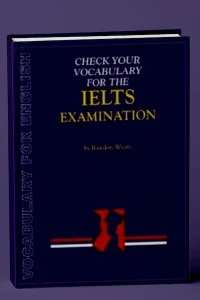Check your vocabulary for IELTS is a helpful source for improving and expanding English language vocabulary in preparation for the IELTS examination.
Check Your Vocabulary for IELTS Examination
This workbook has been written for students who are planning to sit either the general training or the academic modules of the IELTS exam. It covers some of the main vocabulary points that you will need for, or come across in, the listening, reading, writing, and speaking sections of the exam.
We hope that you find the modules in this book useful and that the vocabulary you acquire will help you to achieve the grade you want in the IELTS.
Structure of the IELTS Workbook
Each vocabulary area is presented in the form of a self-contained module with task-based activities which present each vocabulary item in a real context.
- Pages 1-48 focus on general vocabulary items which can be used in all aspects of your English. Some of these are relevant to specific tasks in the IELTS exam (for example, describing how something works, writing a letter, or describing a table).
- Pages 49-95 focus on topic-specific vocabulary areas which may be required in the exam (for example, education, business, and the industry or global problems). Each module consists of three tasks: the first two present vocabulary items in context, and the third gives you the opportunity to review the vocabulary in the form of a gap-fill exercise.
Using the IELTS Workbook
You should not go through the modules mechanically. It is better to choose areas that you are unfamiliar with, or areas that you feel are of specific interest or importance to yourself.
Vocabulary Record Sheet
Remember that you should keep a record of new words and expressions that you learn, and review these from time to time so that they become an active part of your vocabulary. There is a vocabulary record sheet at the back of the book which you can photocopy as many times as you like and use to build up your own personal vocabulary bank.
Extending Your Vocabulary
Also, remember that there are other methods of acquiring new vocabulary. For example, you should read as much as possible from a different variety of authentic reading materials (books, newspapers, magazines, etc).


